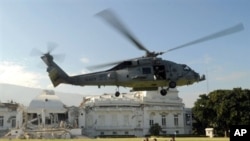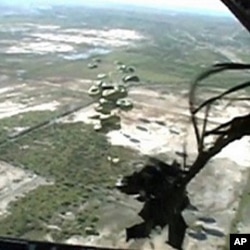A 2,000-strong unit of U.S. Marines began moving ashore west of Port-au-Prince at dawn on Tuesday to help deliver relief to victims of last week's earthquake. Some U.S. troops landed by helicopter at the presidential palace, where crowds of Haitians cheered as the troops began distributing aid. A range of U.S. military efforts are now underway, including airdrops of supplies and the expected arrival of the huge hospital ship the USNS Comfort on Wednesday.
With medical teams and mobile facilities from several countries already in place in Haiti, the deputy commander of the U.S. military effort there, Army Major General Daniel Allyn, says American priorities have shifted to delivering vehicles to distribute aid, machinery to produce clean water and equipment to clear rubble and begin reconstruction. He The U.S. troops are also working with Haitian authorities to re-establish normal production and distribution of water, fuel and other key supplies.
At the same time, General Allyn says the military units must continue to transport food, water and other critical items that are needed immediately. "The delivery of capability here in Haiti is a balancing act that requires troops on the ground to distribute humanitarian assistance, the supplies for them to distribute and the mobility necessary for them to be able to reach the communities that are most stricken," he said.
General Allyn says U.N. and Haitian forces continue to have lead responsibility for security, which he says has been mostly good in very difficult circumstances. "We are watching for signs of instability. At present, there are pockets in areas of Haiti and the U.N. security forces are working with the Haitian national police to address those pockets as they arise. And they have been able to effectively deal with them, and we are confident they will continue to do so," he said.
Allyn says U.S. troops so far are handling security only for their own operations - including establishing facilities on shore near the town of Leogane, west of Port-au-Prince, where a Marine Expeditionary Unit began to arrive Tuesday morning. The Marines are to distribute aid in the area, and will establish a hub for the distribution of relief supplies elsewhere. A Pentagon spokesman says most of the Marines will be based on three ships anchored offshore, with a small security force protecting equipment and supplies onshore at night.
In addition, the U.S. Air Force conducted its first airdrop of supplies on Monday, north of Port-au-Prince, using an aircraft that flew from the United States and returned there after the drop, easing pressure on the Port-au-Prince airport.
General Allyn says such drops will resume on Wednesday. He says ground troops need to secure drop zones for the heavy pallets of water, food and medicine, and that they need vehicles and other capabilities to secure and distribute the aid. "As our assessment determines that we have a gap between the demand on the ground and our ability to deliver, obviously we then adjust the priority on delivery of supplies coming into the theater [i.e., the area] to ensure what is needed can be met," he said.
Among those helping distribute and secure the aid are about 1,000 soldiers from one of the U.S. Army's premier combat units, the 82nd Airborne Division. In all, General Allyn says within the next few days there will be about 5,000 U.S. troops on the ground in Haiti, with another 5,000 on the ships supporting the effort. Among them, by Wednesday, will be the hospital ship USNS Comfort, which will add 1,000 beds, 12 operating rooms and hundreds of medical personnel to the resources available to help the injured. Allyn says a Colombian hospital ship is also on the way.
The general also reports smooth operations at the Port-au-Prince airport, which has been under U.S. control since Friday by agreement with the Haitian government. The Pentagon says the airport is handling more than 100 flights per day, nearly 10 times what it handles normally. General Allyn says he also expects the seaport in the capital to begin at least limited operations during the next few days to enable delivery of supplies by sea.





